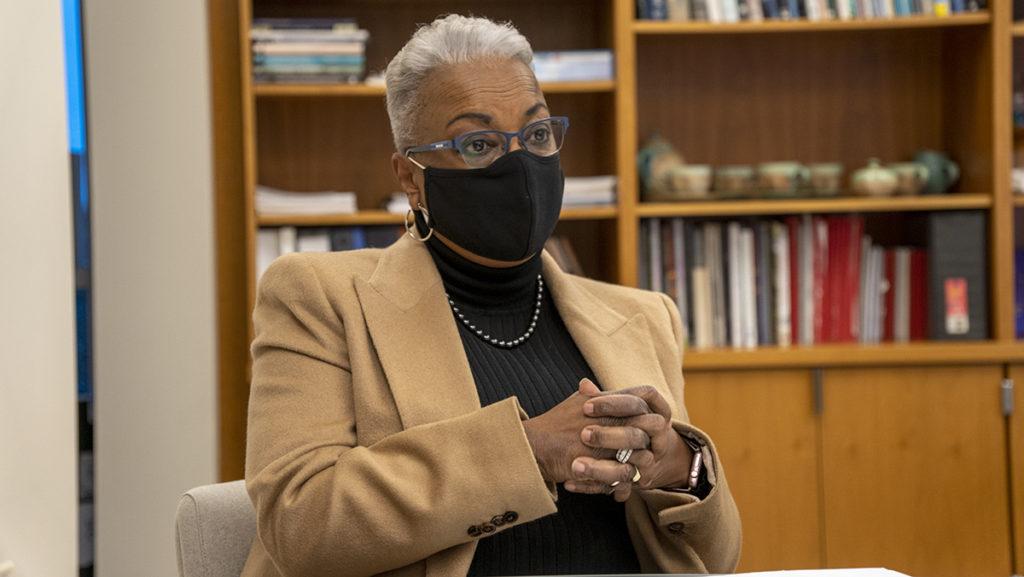Ithaca College Interim President La Jerne Cornish has almost finished her first semester in the position after the college’s ninth president, Shirley M. Collado, announced in August that she was leaving the college.
Cornish officially became interim president Aug. 30. She began the 2021–22 academic year by welcoming the campus community back at the All-College Gathering on Aug. 31 where she and other administrators outlined their goals for the year.
News Editor Caitlin Holtzman spoke with Cornish about student concerns and her goals regarding the return to campus.
This interview has been edited for length and clarity.
Caitlin Holtzman: How has your first semester as interim president been going?
La Jerne Cornish: All things considered, I think it’s going well. This was a surprise, I did not expect to be interim president coming into this school year. … I was, I’m going to use the word excited, by the opportunity to be a force of stability and to provide continuity because I had been here as provost for the last three years. … I think things are going well, all things considered. And we are fully in-person. When I think about where we were last fall compared to where we are this fall, I’m really happy about that. … I said at the beginning of the semester that we were going to demonstrate how to live with COVID. It is December the sixth, and we are demonstrating how to live within a COVID environment. So to me, that’s a plus.
CH: You’ve spoken about the six priorities you had coming into this year, do you think you could expand on those and provide some examples of those that are going to be implemented and how you’re working through them?
LJC: Priority number one was a sustainable financial model and so I’m working with Tim Downs, who’s the [vice president] for Finance and Administration, and the entire Senior Leadership Team to develop the FY23 budget. You know, 5,000 [students] were identified as the sustainable size for the institution. … If we can increase retention, that will also help with stabilizing enrollment. The goal is to increase retention by 1.2% a year for the next five years. … We have a Retention and Engagement Strategy Team, also known as REST, helping us come up with strategies to increase retention. Enrollment matters, and so we now have a new admissions counselor in the DMV [D.C., Maryland and Virginia] areas because we think that that might be a place where we can recruit more students. COVID and public health management, like I said, we’re living with it. … We are following our public health protocols, our students are 99% vaccinated, our faculty and staff are 80% vaccinated and I’m just really proud of our students for making good decisions that have allowed us to still be here at this stage of the game. Omicron has people worried, and we’re seeing an uptick of cases in Tompkins County in particular, but we’re holding steady. … With regard to diversity, equity and inclusion, we hired a new person for [Martin Luther King] Scholars and the First Generation Programs. We just hired a new person for [the Center for Inclusion, Diversity, Equity and Social Change] and then we have someone new to us in Career Counseling, Dave Curry. Shadayvia Wallace for MLK Scholars and Angelica Carrington is coming to us from Cornell as the new director for the Center for IDEAS … For some of our sophomores, this is their first time on our campus. … So how do we connect with one another again? COVID has been challenging in that way. Some of our students have not had in-person instruction since maybe their junior year of high school. So again, learning how to be in school, demonstrating that we care about one another, that we connect with one another in meaningful ways, that matters to me, and I think that that is something that can be a hallmark of Ithaca College in how we care about one another. We launched Canvas this fall. That Learning Management System is a big difference from Sakai. … When I think about what we’ve learned in the last year and a half, we’ve come a long way. We’ve leveraged technology in a positive way. You know, Zoom can be a good thing. Zoom fatigue is real, that can happen, but it can also be a good thing and that it’s a way for people to have meetings. Professors said they saw more students during office hours through Zoom than they did when we were face-to-face or in-person. We need to have a conversation about what we learned and then what we should keep as we continue to move forward.
CH: You spoke a bit about COVID, and something that we’ve noticed on the board and speaking with students is that some have … struggled readjusting to fully in-person classes again while the pandemic is ongoing. Some aren’t fully happy with how things have been handled and the return to in-person classes. How do you respond to these concerns and struggles of some students and do you have any plans to address them in the future?
LJC: One of the choices that we were committed to was being fully in-person in the fall. We are not an online institution. Can we deliver instruction using online technology? Yes we can, but we are primarily a residential living and learning community. For us it was important that students come back and have instruction in person, face-to-face.
CH: Regarding the new variant — and I know cases are rising a bit in the county and a little bit on campus — do you have any concerns going into the spring semester and winter break where there might be potential travel for students?
LJC: I’m sure there will be travel for students because people need to go home and be with their families and rest and renew and restore. But the thing that I pay attention to is the hospitalization rate. … When 99% of your students are vaccinated, even if they have a positive case, we’ve seen the symptoms are less. They’re not as severe. And so to me, we can live with that. As long as our hospitalization rate stays low, then we’re going to come back in the spring semester and we’re going to keep doing what we did for the fall and we’re going to have an amazing in-person commencement, May 22, 2022.
CH: The college is feeling the impacts of the national labor shortage that is ongoing which has affected some students, faculty and staff around campus. Is there anything that you and the Senior Leadership Team are planning to do to address this?
LJC: I don’t know what we can do. We continue to recruit when there are vacancies, we have a meeting to determine if that position is going to be filled. We have job postings out right now so we continue to hire. I’m sure you’ve heard of the Great Resignation because that’s going on as well. People are taking stock of their lives, Caitlin, and they’re trying to decide if they really want to go back to work and if they have options, they are exercising their options. What’s happening with regard to a labor shortage is not specific or unique to Ithaca. This is a worldwide phenomenon … and we are dealing with it as best as we can, but we’re certainly impacted by it as well.
CH: We’ve asked former President Collado about her salary after she announced that she and other administrators were taking a cut. For transparency’s sake I was wondering if you would be willing to share your salary with us?
LJC: I’m going to tell you that if you look at the 990 in 2023, you will be able to see my salary and that is public information and is two-years removed.









